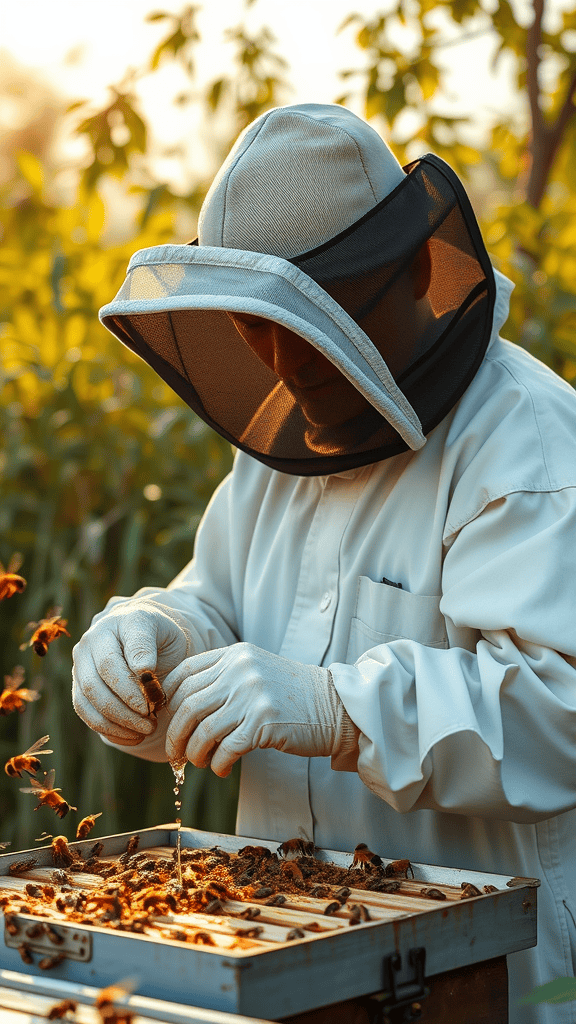Exploring the Unique Characteristics of South Carolina Varietal Honey Beekeeping
South Carolina is known for its rich agricultural heritage, and one of its standout products is varietal honey. Varietal honey is unique because it is made from the nectar of specific plants. In South Carolina, beekeepers focus on harnessing the nectar from local flora, cultivating honey that reflects the region’s diverse landscape and seasonal blooms. Understanding South Carolina varietal honey beekeeping opens a door into the intricate world of bees, flowers, and the vibrant community surrounding this sticky sweetness.
What makes South Carolina honey distinct? The answer lies in the varieties of flowers that bloom throughout the year. Here are some popular varieties:
- Wildflower Honey: This type is made from nectar collected from a mix of wildflowers. It captures the essence of the Carolina countryside.
- Red Clover Honey: Harvested from red clover plants, this honey has a mild flavor and light color.
- Gallberry Honey: Produced from the Gallberry shrub, it features a dark and rich taste, often with herbal notes.
- Blackberry Honey: Sourced from blackberry blossoms, this variety is known for its sweet and fruity flavor.
Beekeeping in South Carolina is more than just a hobby; it’s a way for many to connect with nature and promote environmental health. Local beekeepers actively educate communities about the importance of bees and their role in pollination. By nurturing bee populations, they help sustain local ecosystems. If you’re interested in beekeeping, there are several important strategies to consider.
- Choosing the Right Location: The best honey results from bees that have access to a diverse range of flowers. Ensuring your hives are placed near natural sources of nectar is vital.
- Seasonal Management: Understanding the seasonal patterns of bloom times in South Carolina helps beekeepers manage their hives effectively. This timing is crucial for honey production.
- Sustainable Practices: Healthier bees contribute to better honey. Beekeepers should prioritize organic practices and ensure their bees have access to natural food sources.
Temperature and humidity also play significant roles in the success of South Carolina varietal honey beekeeping. The South has a humid subtropical climate which allows for year-round blooming of various plants. This consistency ensures bees have constant food sources, resulting in a more robust honey yield.
Another interesting aspect of this craft is the community surrounding it. Local beekeepers often come together for events and workshops that offer education and support. This camaraderie fosters a spirit of collaboration. Beekeepers share tips, trade honey, and discuss innovations in their techniques.
The art of beekeeping is not just about the honey; it’s also about responsibility. Beekeepers must protect their colonies from diseases and parasites. One of the most notorious threats is the Varroa mite, a pest that can devastate bee colonies. Effective management strategies include:
- Regular Hive Inspections: This helps to identify any signs of disease or pest infestations early.
- Breeding Resistance: Some beekeepers focus on breeding bees that show resistance to common pests and diseases.
- Integrated Pest Management: Utilizing various biological, cultural, and chemical practices to keep colonies healthy.
For consumers, engaging with local honey producers is an excellent way to support sustainable agriculture. Purchasing South Carolina varietal honey allows you to taste the unique flavors that reflect the local geography. The distinct characteristics of each type of honey offer culinary diversity and intriguing flavor profiles.
Additionally, local honey is beneficial for health. It contains antioxidants, can soothe allergies, and provides a quick energy boost. By choosing local varietal honey, not only do you get a delicious product, but you also support local economies and bee conservation efforts.
Delving into South Carolina varietal honey beekeeping provides a glimpse into a world where nature and agriculture intertwine harmoniously. Whether you’re a beekeeper or a honey enthusiast, understanding these unique characteristics enriches your appreciation for this natural marvel. Embrace the journey of discovering the sweetness that South Carolina offers!
The Benefits of Local Beekeeping Practices for South Carolina’s Ecosystem
Beekeeping is an ancient practice that has gained significant attention in recent years, especially in places like South Carolina. Local beekeeping practices have numerous benefits for the ecosystem, promoting biodiversity, enhancing pollination, and creating a sustainable environment.
One of the key advantages of local beekeeping is the role that honeybees play in pollination. Honeybees are crucial for the pollination of many crops and wild plants. In South Carolina, these bees help pollinate fruits, vegetables, and nuts which are essential for the agricultural economy. This process increases crop yields, contributing to the local food supply and economy.
Moreover, the presence of local beekeepers supports the maintenance of genetic diversity among bee populations. When beekeepers manage their hives close to home, they encourage the growth of diverse bee strains that are better adapted to local conditions. This diversity is important because it can lead to stronger bee populations that are resilient to diseases and environmental changes.
Local beekeeping also helps sustain native plants. As bees pollinate flowers, they contribute to the growth of various plant species. This process not only aids in the reproduction of plants but also maintains the health of ecosystems. A diverse plant community provides habitats for various wildlife, from birds to mammals, creating a balanced ecosystem that benefits all forms of life.
Another significant aspect of beekeeping is honey production. South Carolina honey has unmatched qualities and flavors, thanks to the wide variety of local flora. By supporting local beekeepers, you are helping to sustain this unique honey production which contributes to the state’s agricultural identity. Local honey is often richer in nutrients and more flavorful than mass-produced options, giving you a delicious and beneficial product.
Engaging in local beekeeping practices also raises community awareness about environmental issues and the importance of pollinators. Beekeepers often conduct workshops and events, educating the public about the fragile nature of bee populations and the direct impact of pesticides and habitat loss. This awareness can lead to community initiatives aimed at protecting local wildlife and promoting environmentally friendly practices.
Moreover, beekeeping has a positive impact on soil health. As bees pollinate plants, they assist in the growth of flowering plants that can improve soil stability and reduce erosion. Healthier soil leads to better water retention and supports agriculture and native plant life. In turn, this sustains the entire ecosystem, making it more robust and resilient against climate change.
The economic aspect is also important. Local beekeeping creates jobs, not only for beekeepers but also in related sectors such as agriculture, education, and tourism. A thriving beekeeping community can attract visitors interested in agritourism, workshops, and events focused on local honey and bees. This influx of visitors can boost the local economy significantly.
- Pollination: Essential for crops, leading to higher yields.
- Genetic diversity: Strengthens bee populations against diseases.
- Sustainment of native plants: Supports local wildlife habitats.
- Honey production: Unique local flavors and nutrition.
- Community awareness: Educates the public on environmental conservation.
- Soil health improvement: Enhances agriculture and water retention.
- Economic growth: Creates jobs and boosts local tourism.
In South Carolina, local beekeeping practices are not just about honey production; they embody a sustainable approach to environmental stewardship. Supporting local beekeepers means investing in your community and the planet. Whether you’re a potential beekeeper, a garden enthusiast, or simply someone who enjoys nature, understanding the benefits of local beekeeping is crucial to contributing to a healthier ecosystem.
Every effort counts when it comes to protecting pollinators. Embracing local beekeeping practices can make a significant difference in the ecological landscape of South Carolina. By valuing and supporting these practices, you contribute to the balance of nature, ensuring a thriving environment for future generations.
Conclusion
South Carolina varietal honey beekeeping offers a fascinating glimpse into the art and science of beekeeping, showcasing the unique characteristics that make this region’s honey so special. From the luscious flavors derived from local flora like orange blossoms and wildflowers, to the meticulously crafted hives maintained by passionate beekeepers, each jar of honey tells a story of South Carolina’s diverse environment. These varietal honeys not only satisfy a sweet tooth but also reflect the vibrant ecosystem sustained through responsible beekeeping practices.
Supporting local beekeeping is crucial for South Carolina’s ecosystem. Healthy bee populations play a vital role in pollination, benefiting both agricultural crops and natural plant life. By choosing to embrace local honey, you contribute to the conservation of bee habitats and help sustain the delicate balance of nature. Every time you enjoy a spoonful of South Carolina honey, you support local beekeepers who, in turn, commit to protecting and nurturing the environment.
Engaging with South Carolina’s beekeeping community deepens your appreciation for nature and the interconnectedness of our ecosystems. Whether you’re a honey enthusiast, a curious learner, or someone interested in sustainability, exploring varietal honey beekeeping in this region invites you to partake in an enriching experience. By celebrating and supporting local beekeeping, you not only enjoy the delicious fruits of their labor but also play an essential role in preserving the ecosystem. Your participation helps ensure that these amazing pollinators continue to thrive, contributing to a healthier environment for all.
As an Amazon Associate, I earn from qualifying purchases.

